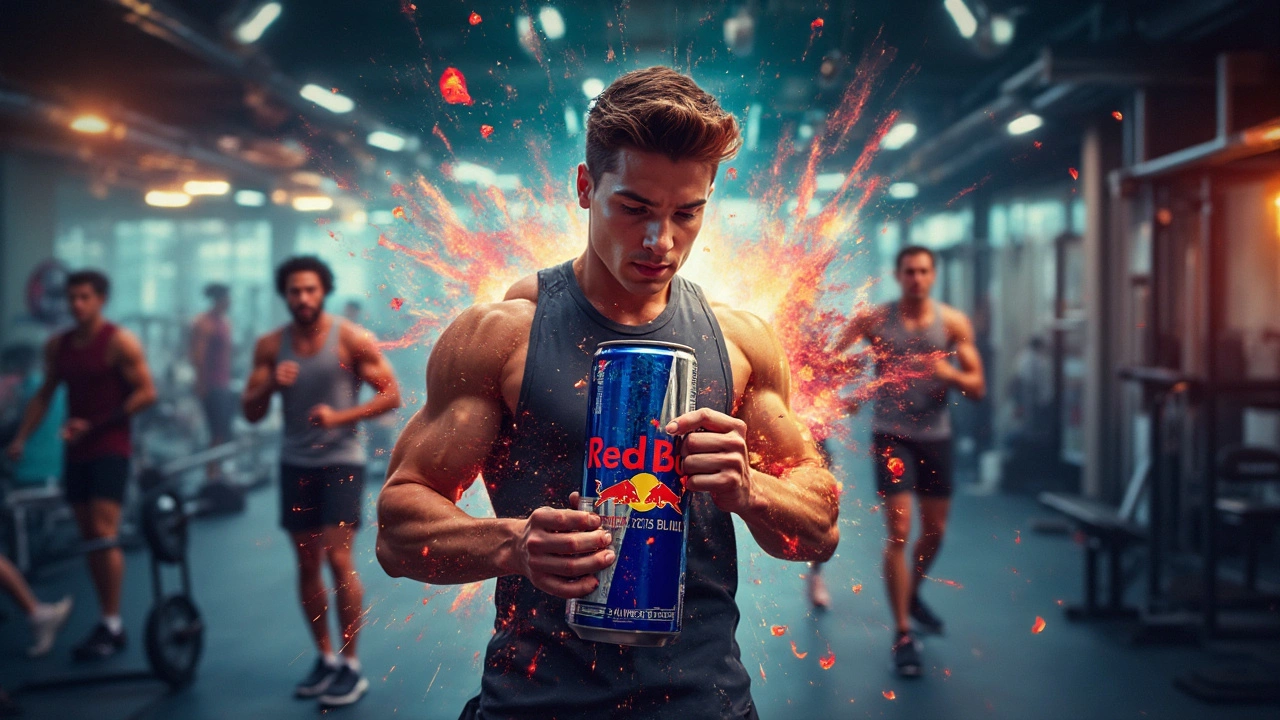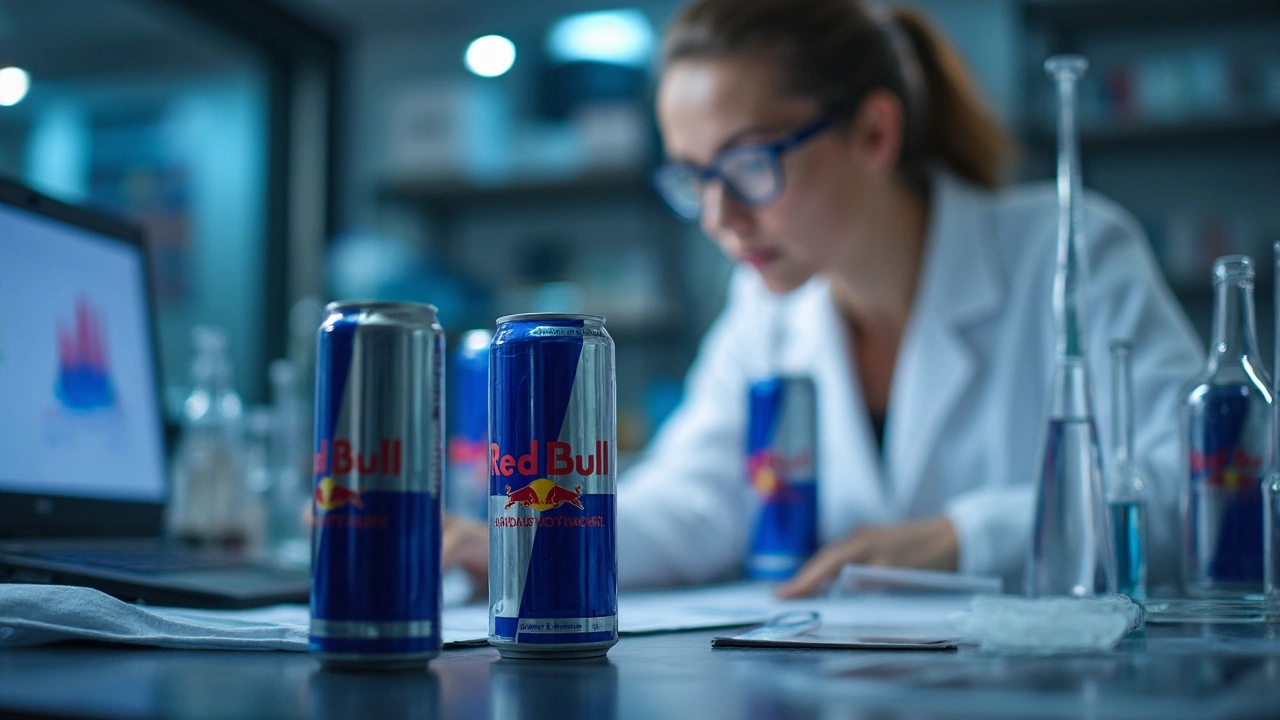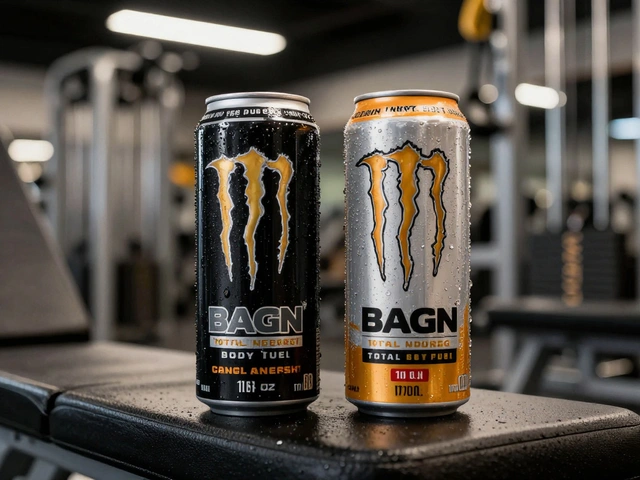Does Red Bull Affect Testosterone Levels?

So, you’re reaching for a Red Bull to power through a workout or pull an all-nighter. But are you wondering if it's affecting more than just your energy levels? Specifically, could it be tinkering with your testosterone? Well, let's chat about what might be going on there.
Testosterone isn’t just some macho hormone. It plays a big role in muscle development, energy levels, and even mood regulation, making it super important for athletes. Meanwhile, Red Bull packs a punch with caffeine, taurine, and a bunch of B vitamins. Sounds like a great combo for a quick boost, right? But the question is, how does all this jazzy stuff interact with our hormone levels?
- Understanding Testosterone and Its Role
- What Makes Red Bull Tick?
- Scientific Findings on Energy Drinks and Hormones
- The Impact on Athletic Performance
- Safety Concerns Worth Noting
- Tips for Energy Drink Consumption
Understanding Testosterone and Its Role
Alright, let's kick things off with testosterone. It's a hormone often linked with muscle-building and strength. Imagine it as your body's natural ally in maintaining muscle mass, bone density, and even your mood. So, knowing how it works is super handy, especially if you're into sports.
Testosterone isn't exclusive to dudes. Women have it too, just in smaller amounts. In athletes, the right levels can mean better performance. It helps ramp up energy, improves endurance, and boosts recovery time post-exercise. Basically, it's like your personal cheerleader helping you crush those workouts!
Our bodies usually regulate testosterone levels like champs. Yet, certain things can cause dips or boosts, like stress, sleep, and, you guessed it, what we consume. That's why this whole Red Bull and testosterone talk is buzzing. Especially since caffeine and other ingredients in energy drinks might mess with hormone levels.
Ever heard of free testosterone and bound testosterone? Free testosterone is the active part, cruising through your bloodstream, ready to act. Bound testosterone hitchhikes with proteins, mostly chilling and waiting for when it's needed. For athletes, the balance between these two can impact performance in big ways.
See, testosterone is more than just a number. It's how well your body handles energy, muscle repair, and mood swings. Understanding this helps you make smart choices, especially when grabbing that energy drink for a pickup.
What Makes Red Bull Tick?
Ever taken a sip of Red Bull and wondered what's really giving you that jolt of energy? It's actually a cocktail of ingredients designed to boost your alertness and physical performance. The main star in this energy drink lineup is caffeine. Each can of Red Bull typically contains about 80 mg of caffeine, roughly the same as a cup of coffee.
Caffeine works by blocking adenosine receptors in the brain, which normally make you feel sleepy. By doing this, it helps you feel more energized and awake. But caffeine isn't flying solo here. There's also taurine, a naturally occurring amino acid thought to support neurological development and help regulate the level of water and minerals in the blood.
Then we’ve got the B vitamins—specifically B3, B5, B6, and B12. These bad boys are essential for metabolizing food into energy (just what you need during a marathon, right?). Each can is loaded with these vitamins to help keep your body's engine running smoothly.
"Red Bull is more than just a caffeine boost; it's a blend of ingredients that aim to enhance both mental and physical performance," says Dr. Lisa Tess, a nutritionist specializing in sports physiology.
And we can't forget the sugar. While the sugar-free version does exist, your regular can of Red Bull packs a sweet punch to provide an instant energy boost. A lot of folks might be wary of this, but in moderation, it can be key for quick energy during intense activity.
- Caffeine: About 80 mg per can – sharpens mental alertness.
- Taurine: An amino acid that may help with energy and focus.
- B Vitamins: Essential for energy metabolism — keeps you fueled.
- Sugar: Provides immediate energy boost, but watch your intake!
So there you have it—a quick look at what goes into giving Red Bull its wings. It's all about the unique blend designed to keep you alert and ready to take on whatever's next, though it pays to enjoy wisely and in moderation.
Scientific Findings on Energy Drinks and Hormones
Let’s get into the juicy part where science meets your favorite energy drinks. So, you've probably heard all kinds of claims about what Red Bull and similar drinks do to your body, but what does science actually say about their impact on testosterone?
Most of the buzz comes from this little ingredient known as caffeine, a key player in almost every energy drink. Research has shown that caffeine can temporarily increase testosterone levels. A study published in the Journal of Applied Physiology found that athletes consuming caffeine before competition had slightly higher testosterone levels than those who didn’t.
"Caffeine consumption, in moderation, can enhance focus and potentially boost hormonal levels, aiding athletic performance. However, relying solely on energy drinks can lead to imbalances," says Dr. Emily Carter, a sports nutritionist.
But don’t pop the cap just yet. Other studies have mixed findings. Some scientists argue that the taurine and sugar content in these drinks might offset any positive testosterone effects caffeine might offer. You know how sugary drinks can mess with insulin levels, right? Well, it's a similar vibe.
If you’re still curious, the European Food Safety Authority reviewed energy drinks extensively. They pointed out that, while caffeine can have stimulating effects, regular high consumption could lead to tolerance, essentially nullifying the boost you’re hoping for.
| Component | Potential Effect |
|---|---|
| Caffeine | Short-term testosterone boost |
| Taurine | Muscle function support |
| Sugar | Possible hormonal imbalance |
The bottom line? Using energy drinks like Red Bull occasionally probably won't throw your hormones out of whack. But if you’re reaching for them every day, it might be time to reassess your intake. Balance is the name of the game here.

The Impact on Athletic Performance
Alright, athletes, let's get into how Red Bull might influence your game. With its high-caffeine content, this energy drink is often marketed as a tool to boost endurance and reduce fatigue. But does drinking it actually give you wings, or is it just a sugar high?
Caffeine, a key ingredient in Red Bull, is a well-known performance enhancer. It acts as a central nervous system stimulant, helping increase alertness and reduce the perception of exertion. This means you might feel like you're pushing less while actually maintaining or even increasing your usual athletic output. That sounds pretty awesome for getting through a tough set or finishing strong on the field, right?
| Ingredient | Function |
|---|---|
| Caffeine | Boosts energy and enhances performance |
| Taurine | Helps with muscle function |
| B Vitamins | Supports energy metabolism |
The thing to keep in mind is the potential effects on testosterone, especially if you're consuming energy drinks frequently. Some discussions in the scientific community suggest that excessive caffeine may impact hormone levels. But we're talking about pretty high consumption here, not the occasional can you grab before a gym sesh.
Moderation seems to be the key. So, if you're relying on Red Bull for a quick kick, just balance it with other healthy habits, like a good diet and regular sleep. This balance will help you stay on top of your game without messing with the important stuff, like testosterone.
And remember, everyone's body responds a little differently. What works for your gym buddy might not be your perfect match, so listen to your body!
Safety Concerns Worth Noting
Okay, first things first. Before grabbing a Red Bull, it's crucial to know about the safety concerns. Sure, it's a go-to for a quick energy burst, but moderation is key to avoid unwanted side effects.
Let's talk caffeine. A can of Red Bull contains around 80 milligrams of caffeine. While that's not as much as your venti Starbucks brew, mixing it with other caffeinated drinks could push you over the edge. Too much caffeine can lead to jitteriness, increased heart rate, or even more serious issues if consumed irresponsibly.
Studies have looked at how energy drinks impact heart health. Research suggests excessive consumption might strain the cardiovascular system, which isn't what you want if you’re keeping fit and healthy.
Then there's sugar. A regular can of Red Bull packs about 27 grams of sugar. That’s quite a bit, especially if you're sipping it often. High sugar intake can lead to energy crashes and weight gain, which isn't great for your athletic goals.
Energy drinks have a cocktail of ingredients, including taurine and B vitamins. While generally safe, mixing these with too much caffeine or alcohol isn't advisable. Some reports hint that combining energy drinks with alcohol can mask intoxication, leading folks to think they're more sober than they actually are – risky, right?
Now, you might be asking, are there regulations? Most places don’t have strict guidelines for energy drink consumption. But just because you can buy them easily doesn't mean you should sip away without a thought. The trick is to enjoy them wisely.
- Consider consulting with a healthcare professional, especially if you have underlying health conditions.
- Keep tabs on daily caffeine from all sources, aiming to keep it within recommended limits.
- Be cautious about sugar intake and check if you're grabbing the sugary version or going sugar-free.
And here’s a handy nugget: If you're training for an event, think about how Red Bull affects your performance and whether it aligns with your fitness strategy.
Tips for Energy Drink Consumption
If you're thinking about grabbing a Red Bull or any other energy drink as a part of your routine, a little know-how can go a long way. Here’s a quick guide to keep things safe and smart:
- Mind the Timing: Knock back your energy drink about 30 minutes before you need that jolt. It gives your body time to absorb it and kick into high gear when you need it most.
- Don't Overdo It: Keep your intake in check. Experts suggest not exceeding one or two cans a day, and definitely avoid combining it with other caffeine-heavy stuff like coffee. Too much caffeine can crank up your heart rate and blood pressure, not to mention leave you feeling jittery.
- Hydrate Properly: Energy drinks aren't a substitute for good old H2O. Make sure to hydrate, especially if you’re sweating buckets during a workout. Dehydration is no joke.
- Watch for the Sugar: Many energy drinks can be loaded with sugar. Consider sugar-free options if you're watching your sugar intake. It’s kinder on the waistline and teeth too.
- Check the Ingredients: Understanding what’s in your drink is golden. Ingredients like taurine, B vitamins, and ginseng are common, but their effects can vary from person to person.
- Pay Attention to Allergies: Some ingredients could trigger allergies. If you have any concerns, maybe chat with a doc before diving in.
By following these tips, you can enjoy your energy drink without it becoming a crash and burn situation. It's all about being smart and moderate in your consumption!






Comments (10)
Morgan ODonnell
18 Jul 2025
Honestly, I didn't know there was even a link between Red Bull and testosterone. It makes sense to question it as those energy drinks hit hard with the caffeine buzz.
From what I've read, caffeine can temporarily increase adrenaline, but does that really mess with hormones like testosterone long term? I'm skeptical.
Plus, athletes usually care about long-term gains, not just quick energy boosts, so it's good to see research focusing on this.
I'd be curious if anyone has noticed changes in performance or mood when swapping Red Bull for something else.
Also, what about the other ingredients like taurine? Do they add up differently in hormone effects or mostly just boost energy?
Patrick Tiernan
18 Jul 2025
Ugh, here we go again. Another fitness myth getting tossed around like it actually matters.
Red Bull is junk, no doubt. But does it tank your testosterone? Absolutely no solid proof. People just love blaming their bad habits on some cool-sounding science.
Also, who even drinks Red Bull as a testosterone booster? Like if you want to raise your T-levels, maybe stop downing soda and actually do some squats.
This whole thing is just lazy thinking. Hormones are complex; caffeine doesn’t magically destroy them. Anyone claiming that is just playing keyboard scientist.
Amy P
19 Jul 2025
This topic fascinates me! I wonder if the caffeine spike might cause hormonal fluctuations temporarily but not necessarily have lasting effects on testosterone.
What about the effect on sleep? Because crappy sleep kills testosterone more effectively than anything else, and Red Bull can wreck your rest, right?
If athletes use Red Bull and then can't recover properly, their testosterone might indirectly take a hit.
I'd love to see detailed studies comparing athletes' hormone levels who consume Red Bull regularly vs those who don’t.
And what about the psychological aspect? The confidence boost after some caffeine might affect performance indirectly too.
Ashley Kuehnel
20 Jul 2025
Hey folks! I’ve actually seen some research on this, and from a nutrition standpoint, moderate Red Bull consumption isn't linked directly with decreased testosterone levels.
The caffeine and taurine might affect your nervous system, giving you energy, but the effect on hormone balance seems minimal and temporary.
However, I always advise athletes to look at their whole diet and lifestyle instead of focusing on one drink. Balance matters more.
And yes, abusing energy drinks can cause issues like sleep disturbances, which indirectly could lower testosterone.
So, it’s about moderation and making sure you’re supporting your body properly.
Colby Havard
21 Jul 2025
It is incumbent upon us to approach such claims with rigorous skepticism. The biochemical mechanisms underlying testosterone production are complex and multifaceted.
Red Bull's constituents, particularly caffeine, may transiently elevate catecholamine levels, yet this does not equate to a sustained alteration in androgenic hormones.
Moreover, the literature is inconclusive and often marred by confounding variables not adequately controlled for in the experimental designs.
Pragmatically, an athletic regimen should emphasize stable and healthy lifestyle choices rather than reliance on stimulants of dubious efficacy.
adam smith
22 Jul 2025
To chime in, the question boils down to whether Red Bull's ingredients have pathological effects on testosterone production, and current formal research suggests not significantly so.
Yet, caution is warranted with excessive consumption known to disrupt sleep and possibly adrenal function.
My suggestion: athletes maintain a parsimonious approach to energy supplements and prioritize nutritional adequacy.
Given the paramount role of testosterone in recovery and performance, erring on the side of conservative intake is judicious.
Mark Nitka
23 Jul 2025
Look, we don't need to overcomplicate this. Red Bull is an energy drink, not a hormone modulator.
Sure, caffeine can push your heart racing and make you feel amped up, but the question about testosterone? That's a stretch.
That said, regular energy drink guzzling might mess with your lifestyle — bad sleep, junk food, and stress — all of which tank your testosterone.
So in the end, it's about lifestyle habits. Red Bull is more a part of the problem than the direct cause.
I say focus on solid nutrition, good rest, and consistent training instead of chasing quick fixes.
Sam Rittenhouse
24 Jul 2025
This is such an interesting discussion. From an empathetic view, many people rely on energy drinks for their demanding schedules, but often neglect longer-term health effects.
The immediate energy surge can mask fatigue but doesn’t replace proper recovery, which testosterone regulation heavily depends on.
It’s a little dramatic but true: relying on stimulants like Red Bull isn’t sustainable for athletes concerned with hormone health.
People should be aware of the indirect effects – like poor sleep quality – that can disrupt hormonal balance more than the drink itself.
So, the takeaway is: use energy drinks carefully, be mindful of overall wellness, and don’t expect magic from a can.
Ben De Keersmaecker
25 Jul 2025
The inquiry into Red Bull's influence on testosterone lends itself to a broader cultural dialogue about the reliance on stimulants within modern athletic frameworks.
Historically, societies have embraced various concoctions for performance enhancement, yet the ethical and physiological implications remain contested.
Red Bull's composition — caffeine, taurine, vitamins — may induce temporary physiological arousal, but does this translate into meaningful endocrine disruption? Evidence leans toward a negative conclusion.
One must consider the psychosocial context: does the consumption alter training habits, sleep patterns, or stress? These factors arguably bear more weight.
Therefore, the holistic lifestyle remains the definitive determinant of hormonal health.
Aaron Elliott
26 Jul 2025
While speculative arguments abound, it is prudent to distinguish between biochemical fact and anecdotal conjecture.
Energy drinks like Red Bull contain potent stimulants that transiently influence metabolic pathways, yet sustained alterations to testosterone levels are not empirically substantiated.
Furthermore, the heterogeneity in individual responses complicates universal assertions.
This discourse should pivot towards fostering informed consumption grounded in scientific understanding rather than succumbing to alarmist narratives.
I advocate for comprehensive, balanced approaches to nutrition and athletic training as the cornerstone of hormonal regulation.